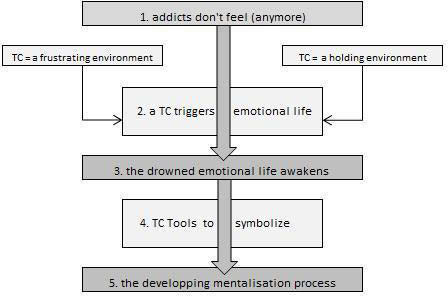No CrossRef data available.
Published online by Cambridge University Press: 16 April 2020
Drug free Therapeutic Communities (TC’s) for addiction developed outside the medical and mental health care. Although these programs have proven to be effective, the why and how of the treatment process stays misunderstood. This ‘Black Box of the TC's’ threatens their continued existence and has led to a call for qualitative research.
To investigate the treatment process, the first author fully immersed herself in the Belgian TC ‘Trempoline’ for 3 weeks. The full participation strongly affected research possibilities: record equipment was taken away and the exigent day’s schedule left few moments to note.
Paradoxically, such frustrating experience proved to be an integral part of the treatment process. The data-set was analyzed with thematic analysis.
This resulted in a model consisting of 5 main themes which clarifies how the TC-program (themes 2 and 4) influences its residents (themes 1, 3, 5) (see figure 1).

The frustrating but at the same time holding environment reactivates the residents’ drowned emotional life. By applying symbolization-tools they learn to deal with the increasing tension in a mentalised way instead of acting out their discontent.
We conclude that a TC tackles the disruptive affect-regulation in people suffering from addiction by triggering and developing their mentalisation process.
Comments
No Comments have been published for this article.